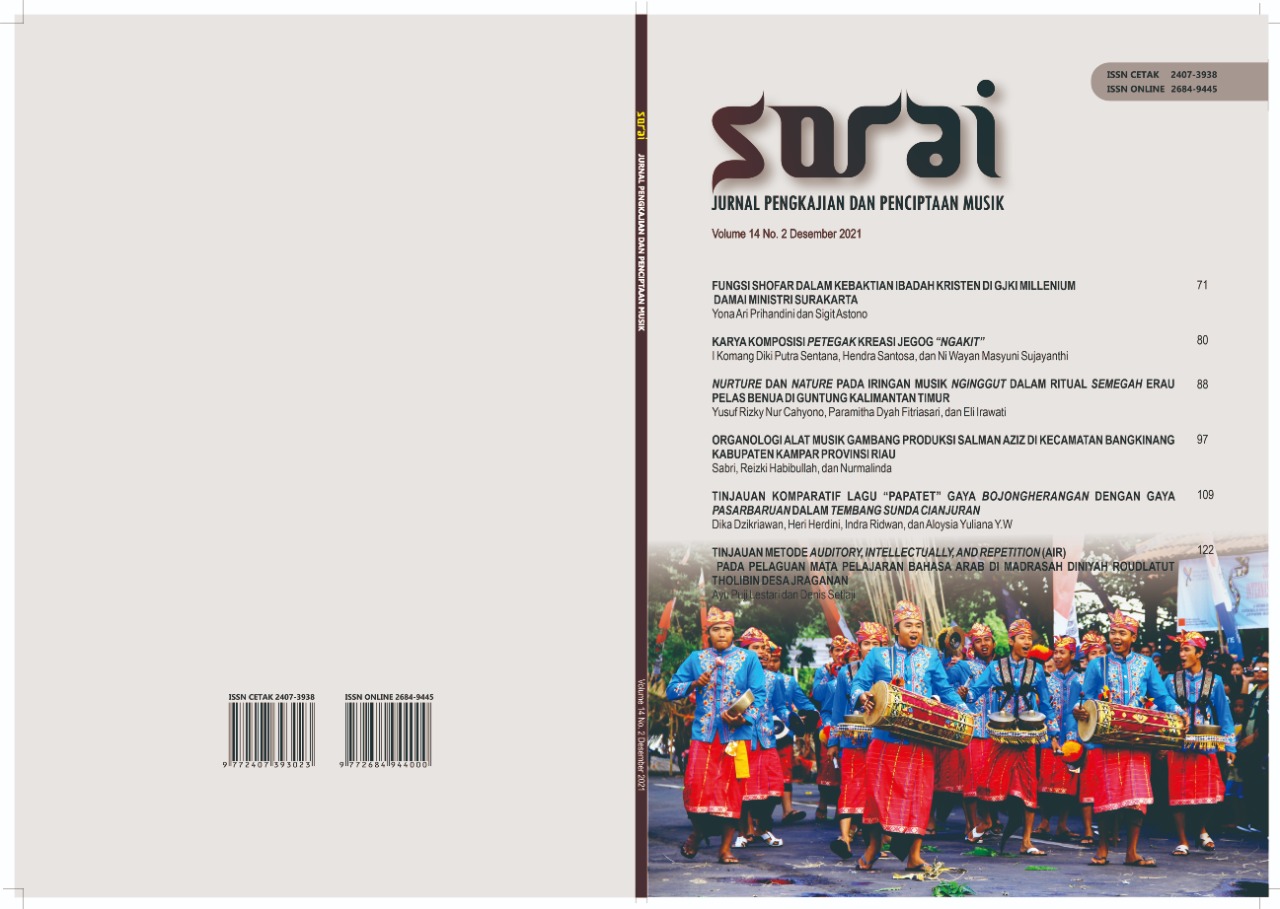TINJAUAN METODE AUDITORY, INTELLECTUALLY, AND REPETITION (AIR) PADA PELAGUAN MATA PELAJARAN BAHASA ARAB DI MADRASAH DINIYAH ROUDLATUT THOLIBIN DESA JRAGANAN
Main Article Content
Abstract
Today, the world of education has used a lot of singing methods in studying material, one of which is Madrasah Diniyah Roudlatut Tholibin at Jraganan Village. The singing method carried out, specifically in Arabic subjects in grades one and two, was translated into Javanese. This song is allegedly related to the Auditory, intellectually, and Repetition (AIR) learning model. To prove this, this research uses qualitative research methods through observation, interviews, and literature study. This search aims to reveal the signal of the link between the learning methods at the madrasah and the Auditory, Intellectually, and Repetition (AIR) learning model. In addition, this study also aims to reveal the shortcomings in the singing method in the madrasah. From the existing searches, it was found that the learning steps in the madrasah reflected the Auditory, Intellectually, and Repetition (AIR) learning model. In addition, it is revealed that the students understand better when the meaning of Arabic is transmitted into Indonesian.
Downloads
Article Details

This work is licensed under a Creative Commons Attribution-ShareAlike 4.0 International License.
Copyright
Authors who publish to Sorai: Jurnal Pengkajian dan Penciptaan Musik agrees to the following terms:
- Authors retain copyright and grant the journal right of first publication with the work simultaneously licensed under a Creative Commons Attribution License (CC BY-SA 4.0) that allows others to share the work with an acknowledgment of the work's authorship and initial publication in this journal.
- Authors can enter into separate, additional contractual arrangements for the non-exclusive distribution of the journal's published version of the work (e.g., post it to an institutional repository or edit it in a book), with an acknowledgment of its initial publication in this journal.
- Authors are permitted and encouraged to post their work online (e.g., in institutional repositories or on their website) before and during the submission process, as it can lead to productive exchanges, as well as earlier and greater citation of published work.
References
Ainia, Q., Kurniasih, N., & Sapti, M. (2012). Eksperimentasi Model Pembelajaran Auditory Intellectually Repetition (Air) Terhadap Prestasi Belajar Matematika Ditinjau Dari Karakter Belajar Siswa Kelas Vii Smp Negeri Se-Kecamatan Kaligesing Tahun 2011-2012.
Aung, Ya Min. 2019. “How Culture Is Transmitted to Younger Generation in Myanmar Education.” International Journal of Ad- 46 Volume 14 No. 1 Juli 2021 vanced Research in Science, Engineering and Technology 6(10):11027–37
Sumiati, D., Bahar, A., Handayani, D., & Studi Pendidikan Kimia Jurusan PMIPA FKIP, P. (n.d.). SISWA KELAS X MIA 1 SMAN 8 KOTA BENGKULU. 2019(2), 114–122.
Pujiastutik, Henrik. 2016. “Penerapan Model Pembelajaran AIR (Auditory, Intellectually, Repetition) untuk Meningkatkan Hasil Belajar Mahasiswa Mata Kuliah Belajar Pembelajaran. Proceeding Biology Education Conferece 13. No. 1: 515518.
Meier, Dave. 2002. “The Accelerated Learning Handbook: Panduan Kreatif Dan Efektif Merancang Program Pendidikan Dan Pelatihan.” Bandung: Kaifa.
Sasmita, Pelangi Dienna Deyane. 2022. “Proses Kreatif Siswa Homeschooling Dalam Penciptaan Musik Melalui Pembelajaran Gitar (Studi Kasus: Kelas Gitar Sanggar Regenerasi).” Sorai: Jurnal Pengkajian Dan Penciptaan Musik 14(1):35–46.
Setiaji, Denis. 2020. “DONGKARI: INTERPRETASI PENEMBANG TERHADAP PEMBENTUKAN ORNAMENTASI VOKAL TEMBANG SUNDA CIANJURAN.” Sorai: Jurnal Pengkajian Dan Penciptaan Musik 13(1):51–62.
Setyoko, Aris, Bayu Arsiadhi Putra, and Kresna Syuhada Rawanggalih. 2022. “Perspektif Etnomusikologi Dan Musikologi Komparatif Terhadap Musik Sebagai ”Bahasa Universal”.” Sorai: Jurnal Pengkajian Dan Penciptaan Musik 14(1):1–11.
Widianti, Kurnia. 2020. “Pengaruh Model Pembelajaran Auditory Intellectually Repetition (Air) Berbantu Media Lagu Fisika Bernada Shalawat Terhadap Hasil Belajar Kognitif Peserta Didik Kelas Viii Mts Al-Hikmah Bandar Lampung.” UIN Raden Intan Lampung.
Utami, Putri Sekartaji. 2018. “Pembelajaran AIR (Auditory Intellectually Repetition) untuk Meningkatkan Kemampuan Koneksi Matematis Siswa dalam Menyelesaikan Masalah”. Skripsi. Program Studi Matematika. Fakultan Keguruan dan Ilmu Pendidikan. Universitas Muhammadiyah Malang. Malang.
